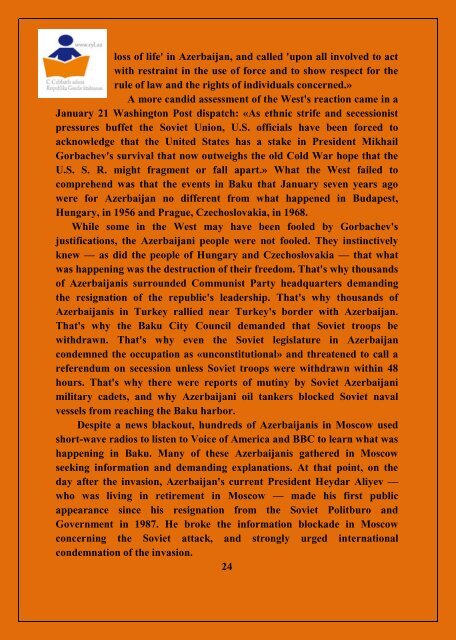TƏCAVÜZ - Respublika Gənclər kitabxanası
TƏCAVÜZ - Respublika Gənclər kitabxanası
TƏCAVÜZ - Respublika Gənclər kitabxanası
You also want an ePaper? Increase the reach of your titles
YUMPU automatically turns print PDFs into web optimized ePapers that Google loves.
loss of life' in Azerbaijan, and called 'upon all involved to act<br />
with restraint in the use of force and to show respect for the<br />
rule of law and the rights of individuals concerned.»<br />
A more candid assessment of the West's reaction came in a<br />
January 21 Washington Post dispatch: «As ethnic strife and secessionist<br />
pressures buffet the Soviet Union, U.S. officials have been forced to<br />
acknowledge that the United States has a stake in President Mikhail<br />
Gorbachev's survival that now outweighs the old Cold War hope that the<br />
U.S. S. R. might fragment or fall apart.» What the West failed to<br />
comprehend was that the events in Baku that January seven years ago<br />
were for Azerbaijan no different from what happened in Budapest,<br />
Hungary, in 1956 and Prague, Czechoslovakia, in 1968.<br />
While some in the West may have been fooled by Gorbachev's<br />
justifications, the Azerbaijani people were not fooled. They instinctively<br />
knew — as did the people of Hungary and Czechoslovakia — that what<br />
was happening was the destruction of their freedom. That's why thousands<br />
of Azerbaijanis surrounded Communist Party headquarters demanding<br />
the resignation of the republic's leadership. That's why thousands of<br />
Azerbaijanis in Turkey rallied near Turkey's border with Azerbaijan.<br />
That's why the Baku City Council demanded that Soviet troops be<br />
withdrawn. That's why even the Soviet legislature in Azerbaijan<br />
condemned the occupation as «unconstitutional» and threatened to call a<br />
referendum on secession unless Soviet troops were withdrawn within 48<br />
hours. That's why there were reports of mutiny by Soviet Azerbaijani<br />
military cadets, and why Azerbaijani oil tankers blocked Soviet naval<br />
vessels from reaching the Baku harbor.<br />
Despite a news blackout, hundreds of Azerbaijanis in Moscow used<br />
short-wave radios to listen to Voice of America and BBC to learn what was<br />
happening in Baku. Many of these Azerbaijanis gathered in Moscow<br />
seeking information and demanding explanations. At that point, on the<br />
day after the invasion, Azerbaijan's current President Heydar Aliyev —<br />
who was living in retirement in Moscow — made his first public<br />
appearance since his resignation from the Soviet Politburo and<br />
Government in 1987. He broke the information blockade in Moscow<br />
concerning the Soviet attack, and strongly urged international<br />
condemnation of the invasion.<br />
24


